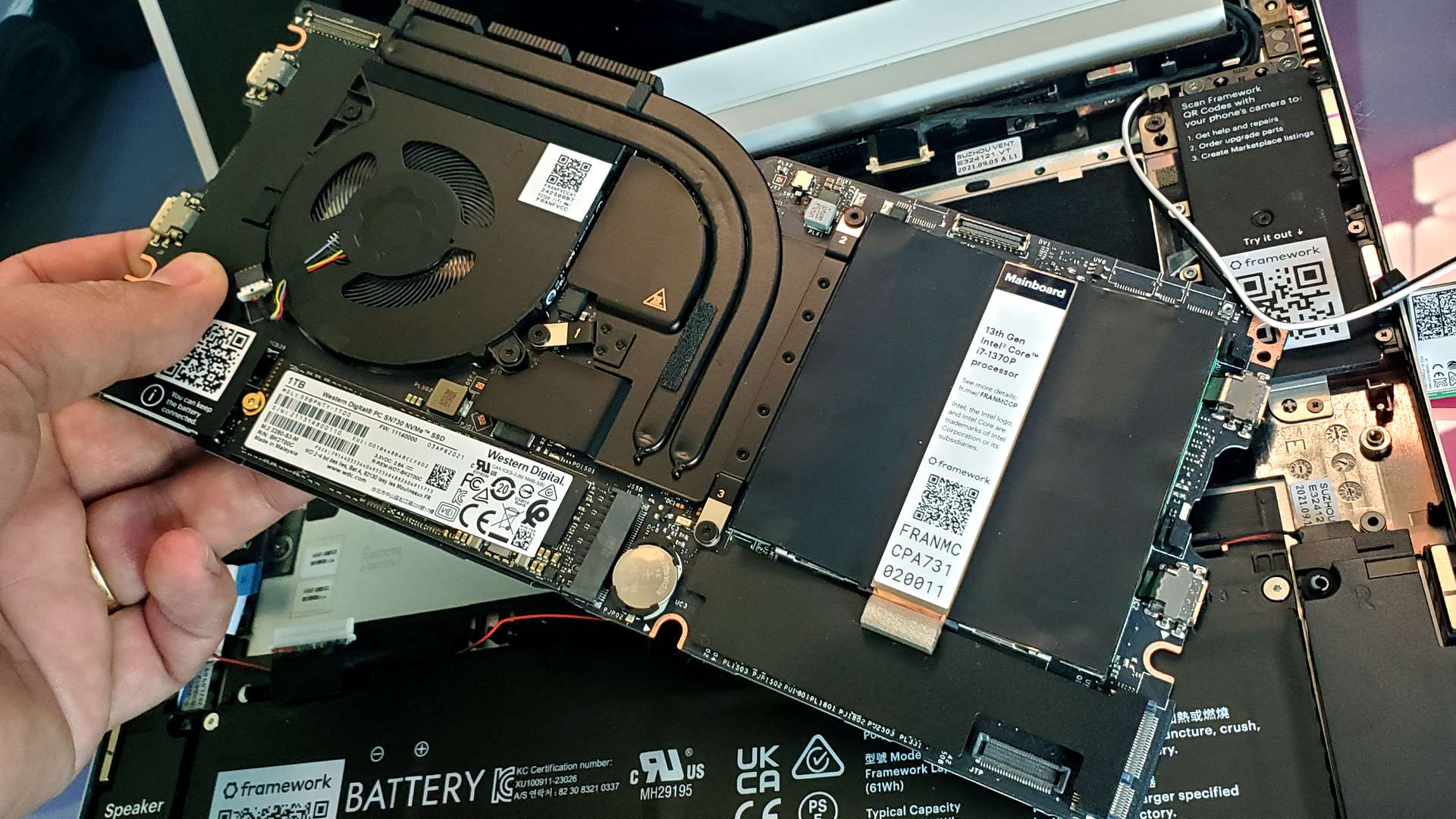Our Verdict
Offering little over the existing, now-discounted 12th Gen mainboards, the Core i7 1370P version is impossible to recommend at this price. But that's also because Framework is broadening its horizons and its first AMD mainboard is such a tantalising prospect.
For
- Super easy to install
- Big upgrade over an 11th Gen laptop
Against
- But little tangible performance boost over 12th Gen
- Expensive
- The AMD mainboard is the one we really want
PC Gamer's got your back
Framework is a different kind of laptop manufacturer. It's very much built around the zeitgeist of the right to repair our own consumer electronics. Its ethos is about producing a device that allows you to repair, replace, and upgrade pretty much any part of it.
My first taste of the Framework 13 was with an 11th Gen Tiger Lake mainboard inside it, and in a little over 15 minutes I've pulled that apart and now have a 13th Gen Raptor Lake system up and running, with all my apps and files in place. That's many times quicker than you could replace your desktop motherboard.
In between I've had it configured with a 12th Gen mainboard, too, such is the joy of Framework's modular notebook system.
This is the top-end Framework 13th Gen mainboard, and it's as simple to upgrade as all the rest. But it's a victim of the expansion of Framework's ambitions, and certainly not the upgrade I'd be making right now, either from an existing 11th or 12th Gen system.
Before I first got my hands on this Framework 13 laptop I assumed the ability to do such wholesale updates would require some chonky boi slab of a notebook in which you'd ostensibly be bolting in a desktop CPU in alongside your SSD and RAM and be done.
It's not like that at all; the Framework 13 is a proper ultrabook-style 13-inch laptop with a simple style that's effortlessly easy on the eye. It's not quite Dell XPS 13 gorgeous, but I'll happily forgive it that for the fact that not everything is soldered onto an untouchable PCB entombed within that slight frame.
With the Framework 13 you just pop a handful of T5 screws using the supplied dual-ended tool—which remain in the chassis so you don't lose them—and then you can simply lift off the keyboard and trackpad faceplate which is now just attached by magnets.
From there you have unfettered access to every part of the machine, with the ability to replace everything from standard parts most laptops will let you, such as RAM and SSD, to things nothing else will. Whether it's the speakers, hinges, display, or mainboard itself, it's all replaceable.
What's more it's all easily found on Framework's Marketplace and easily installed thanks to the fact you literally just need the one tool you get supplied in the box with your laptop. That's a level of access no other mobile device will afford you in PC land outside of maybe the Steam Deck.
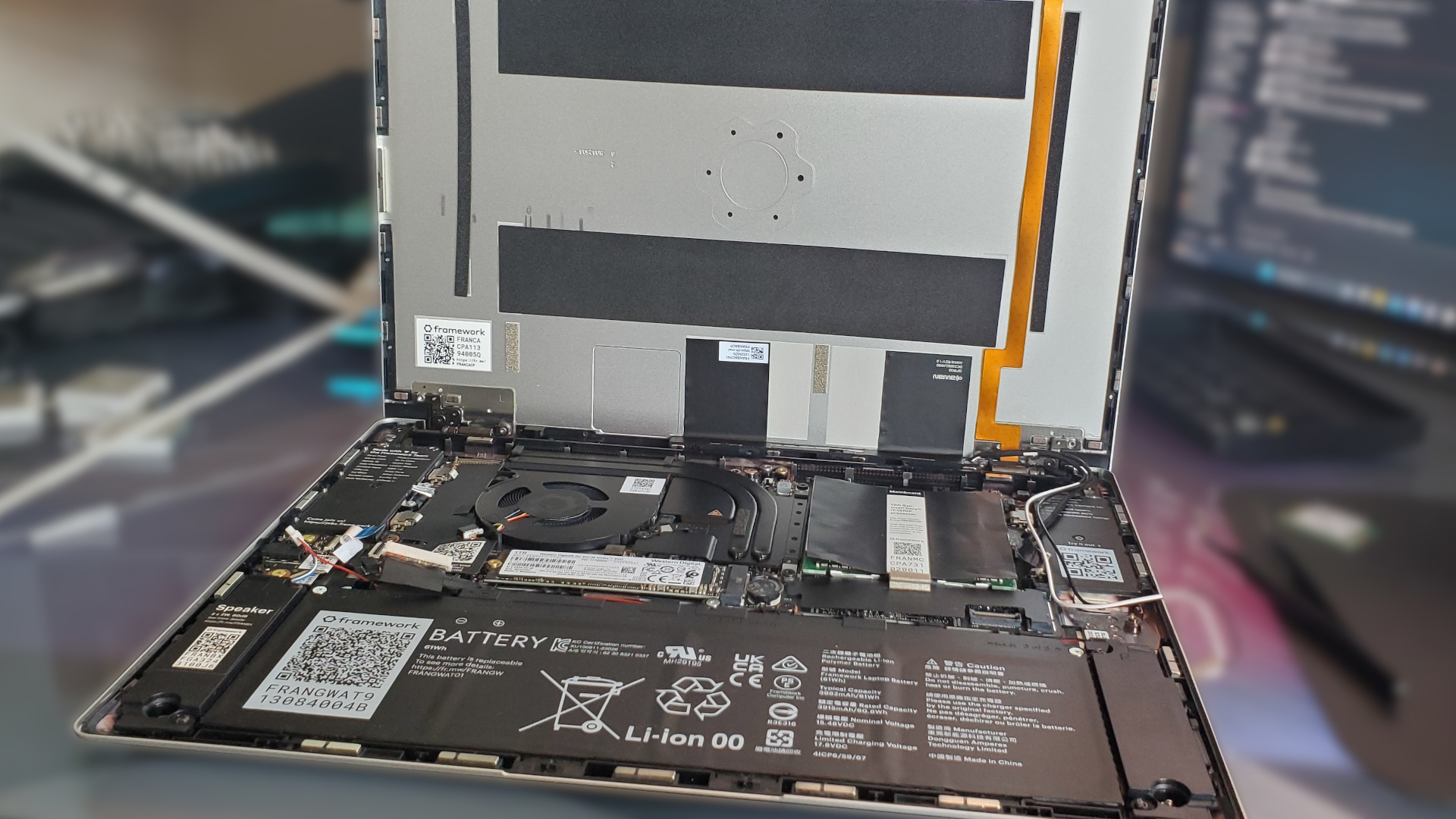
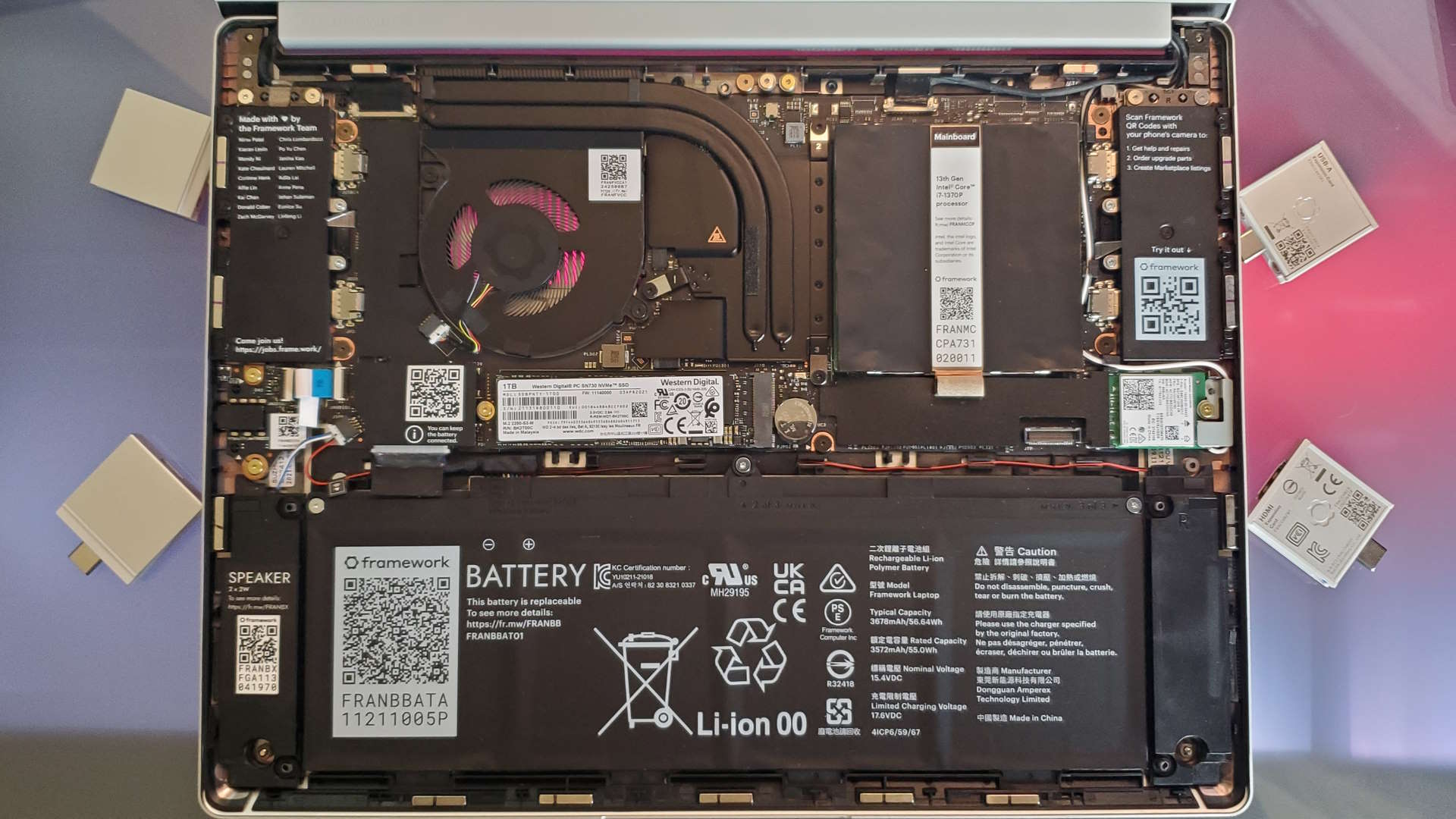
As part of the 2023 13th Gen upgrade kit I've tooled up this little laptop of Theseus with a new Core i7 1370P mainboard. That comes with a 14-core chip at its heart, comprised of six Performance cores and eight Efficient cores for a total of 20 threads (thanks to Hyperthreading on the six powerful Raptor Lake cores).
You can buy this mainboard on its own to upgrade your existing Framework 13 laptop, but if you do want this top-end chip it will set you back a heady $1,049 | £1,049. That's the price of a whole new laptop on its own, though if I were to price this system's spec up as a whole new Framework 13 you're looking at twice that.
It's worth noting that, as this is a Raptor Lake mainboard upgrade, there's not a whole lot of difference between it and the previous 12th Gen Alder Lake parts. The Core i7 1280P I've just swapped out for this Core i7 1370P is all but identical apart from having a slightly lower peak clock speed on the CPU and GPU. And that's about it, which means there's no sense in looking at this as an upgrade for an existing 12th Gen system.
The performance difference between 11th and 13th Gen laptop processors is pretty hefty, considering you're going from a quad-core, eight-thread part up to a 14-core, 20-thread chip. But then that's also the same as upgrading to a 12th Gen board.
With the release of the 13th Gen mainboards, Framework is discounting the older generations, and for me a cheaper 12th Gen option would serve the same purpose for anyone on the earlier 11th Gen devices.
Benchmarks
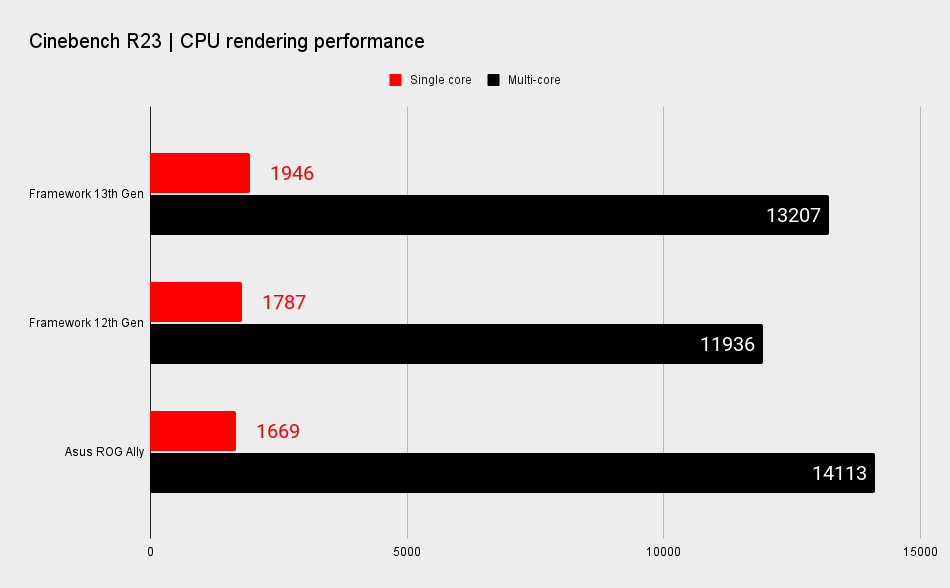
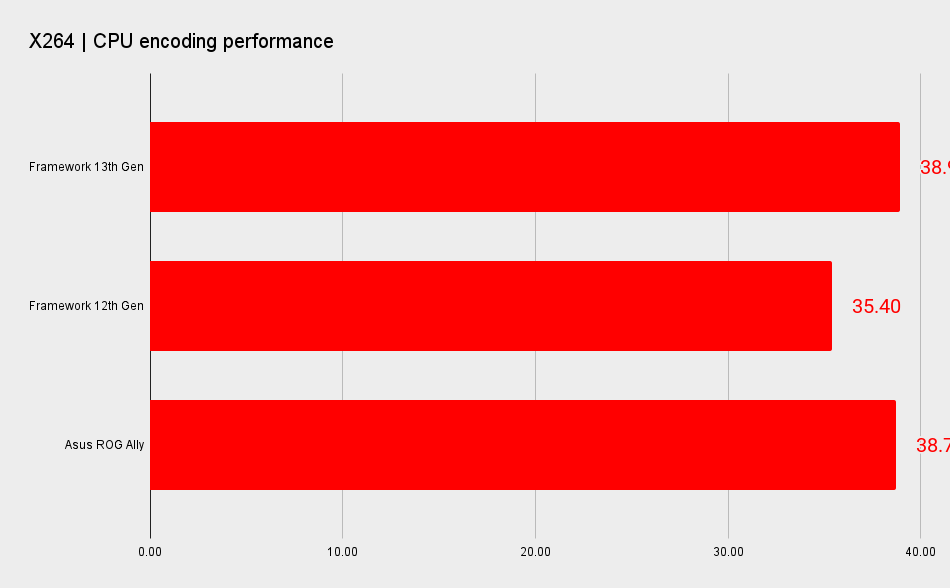
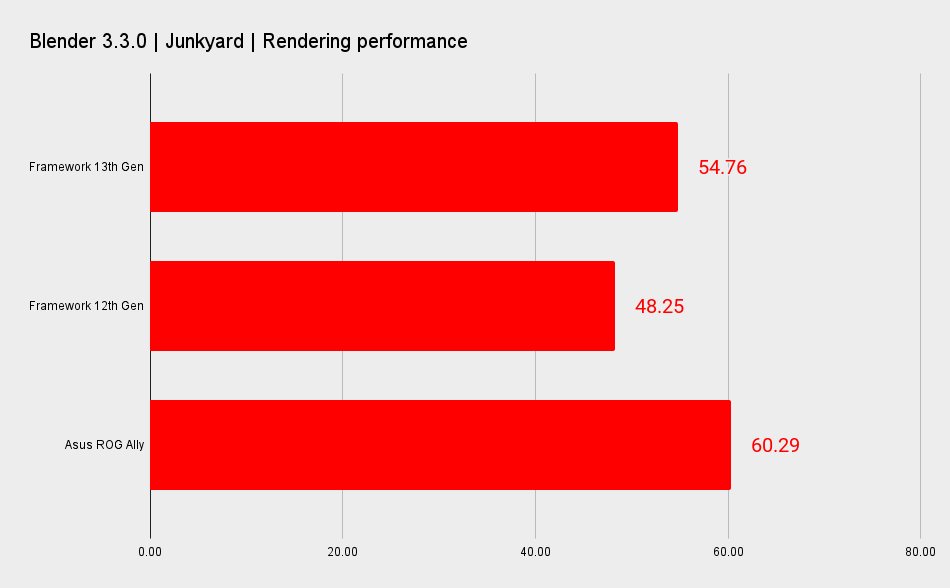
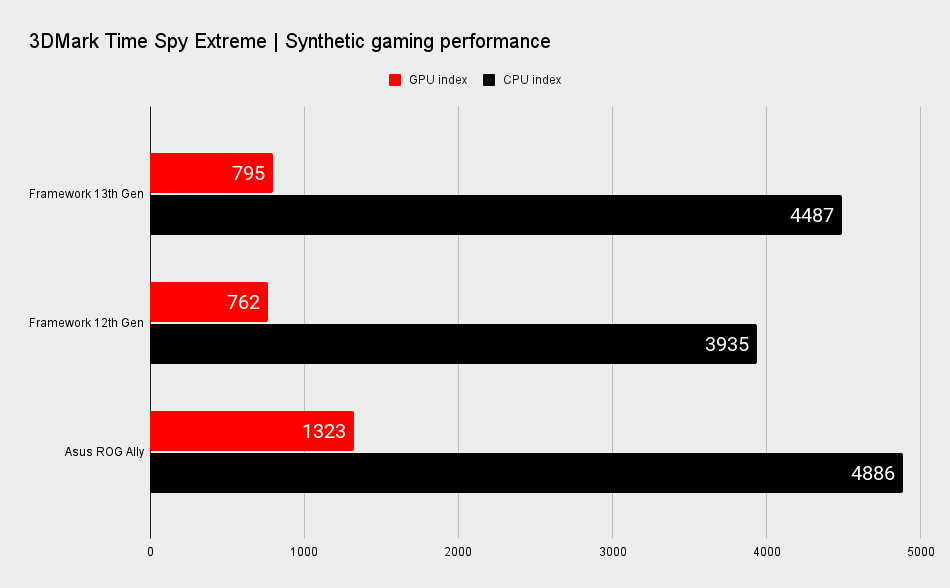
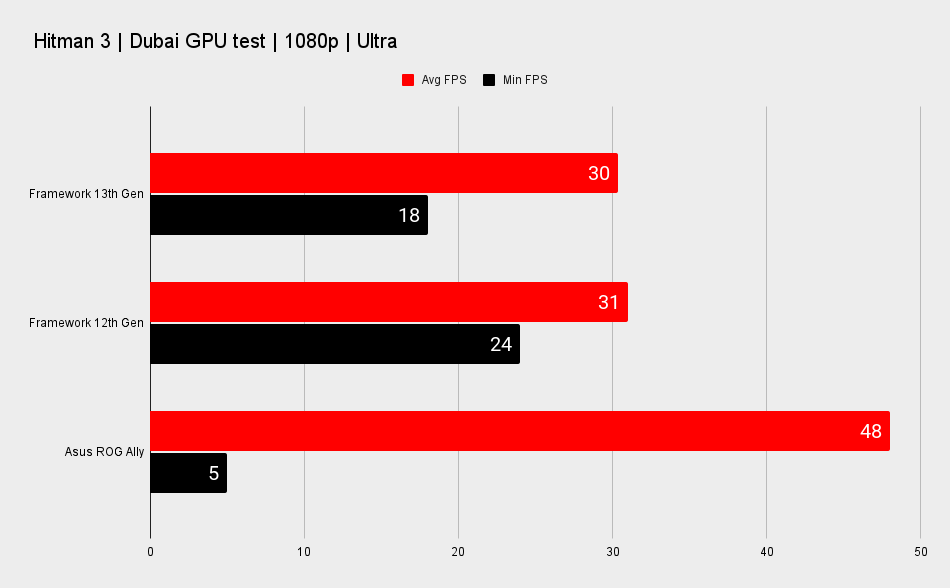
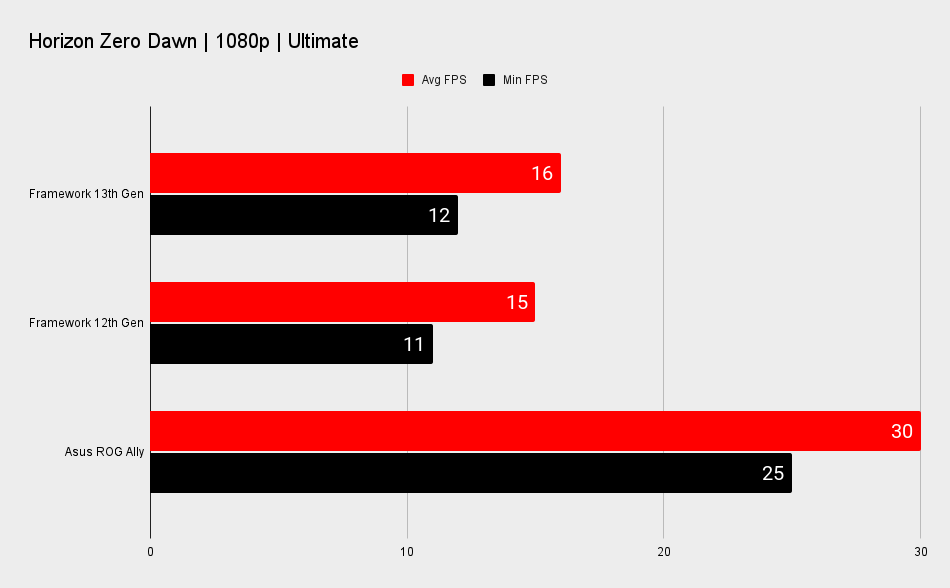
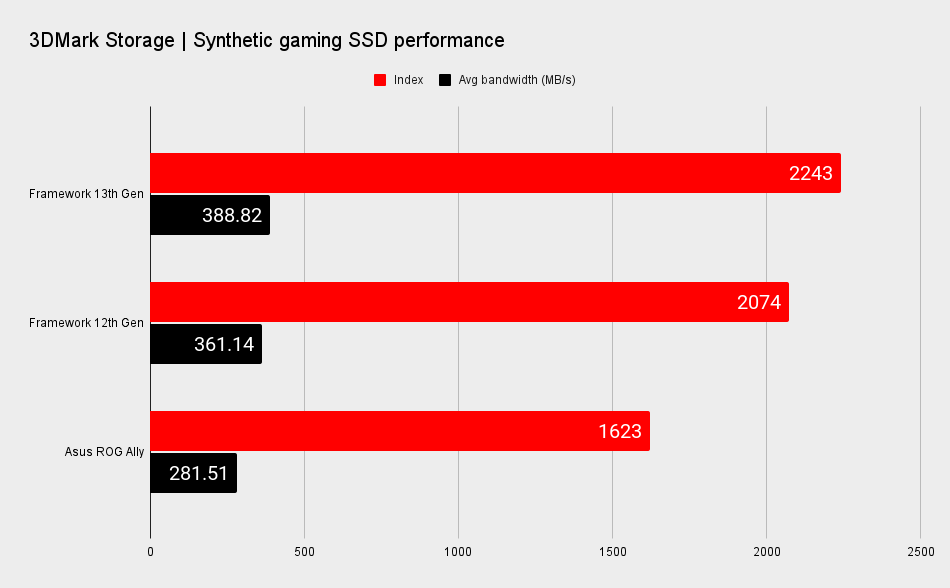
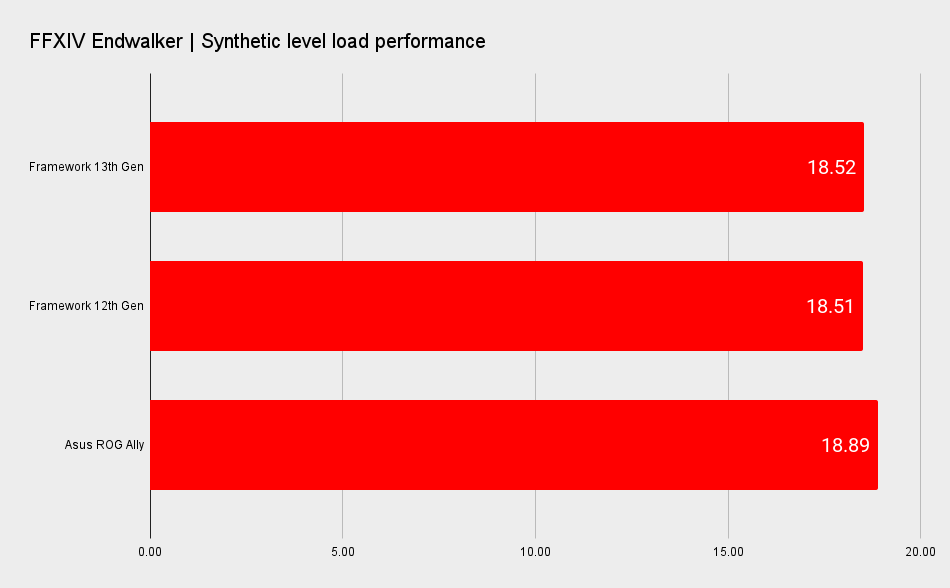
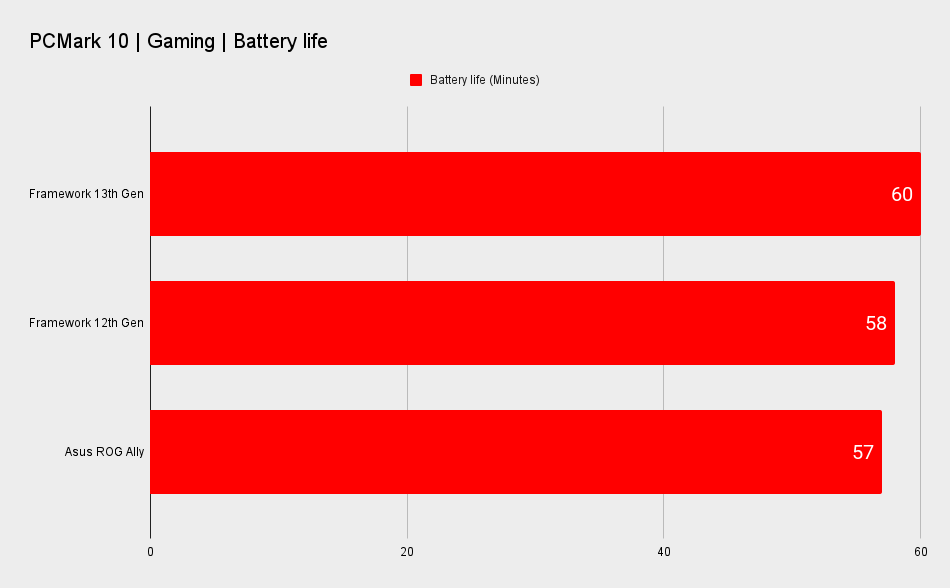
RAM: 32GB DDR4-3200
Storage: 1TB Western Digital SN730
OS: Windows 11 22H2
Sadly, the GPU performance has barely changed across any of the Intel generations, so there's no hope of having a gaming performance bump for your money on any upgrade.
Which is a big shame, and honestly one of the reasons I'm not sold on this particular part as a great upgrade choice. The other is because Framework has now broadened its horizons to include AMD for the first time this generation, and I desperately want to get my hands on the Ryzen 7 7840U mainboard upgrade.
That's essentially the same chip used in the ROG Ally handheld, and makes for both an outstanding number-crunching device as well as a very capable gaming machine. Given the benchmarks I've got out of Asus' excellent handheld, a Framework 13 with that chip inside it would be a dream.
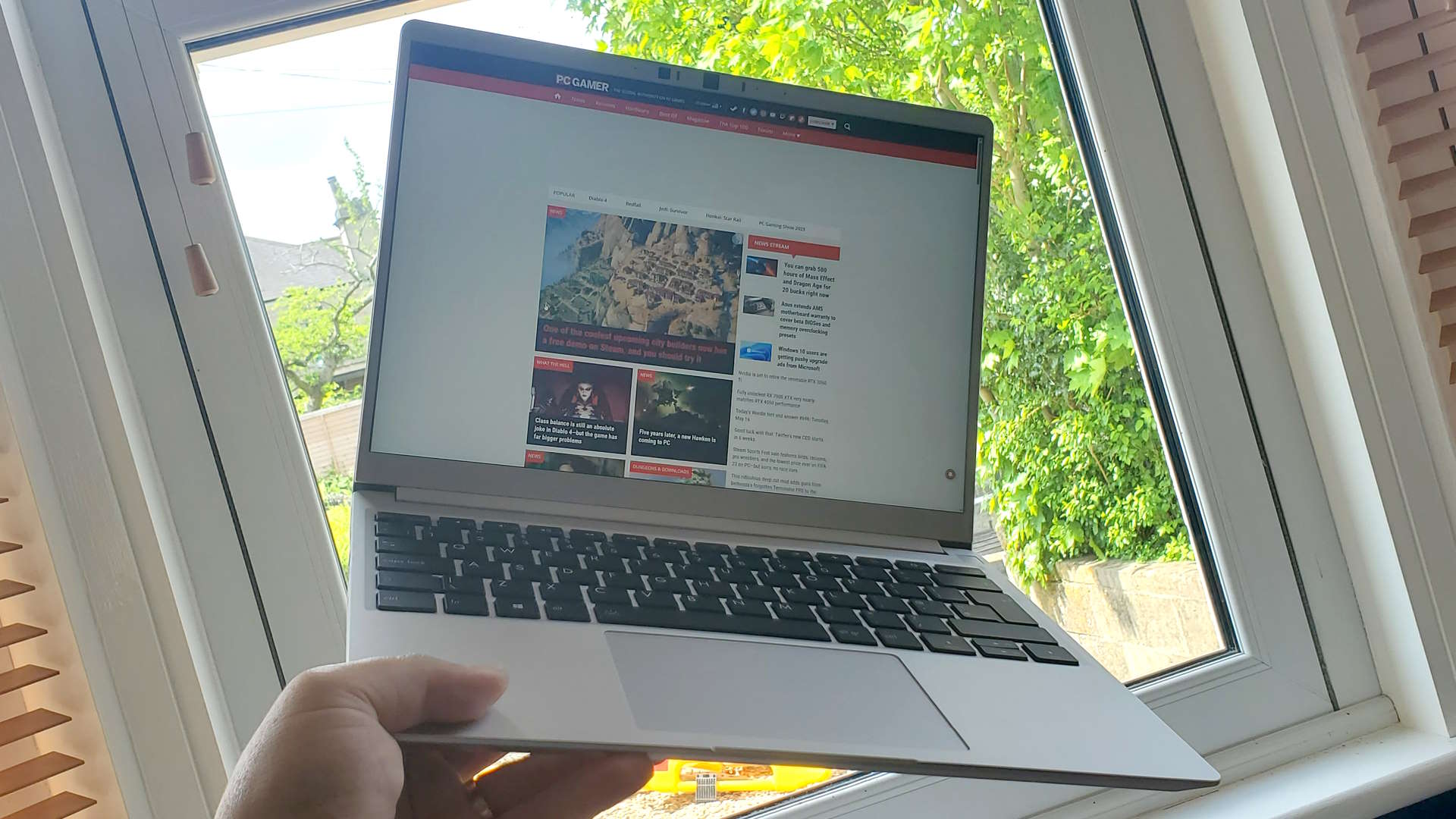
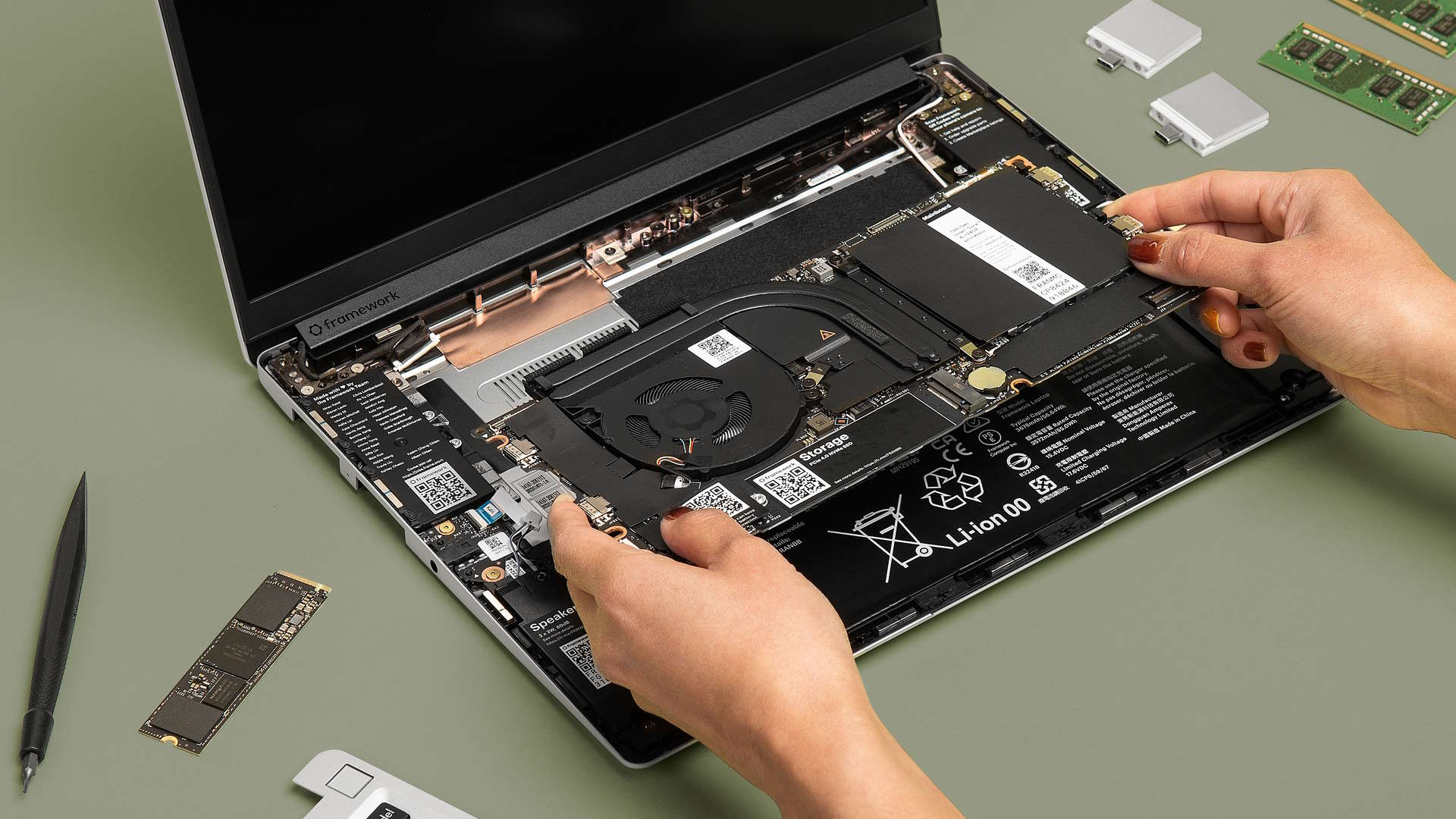
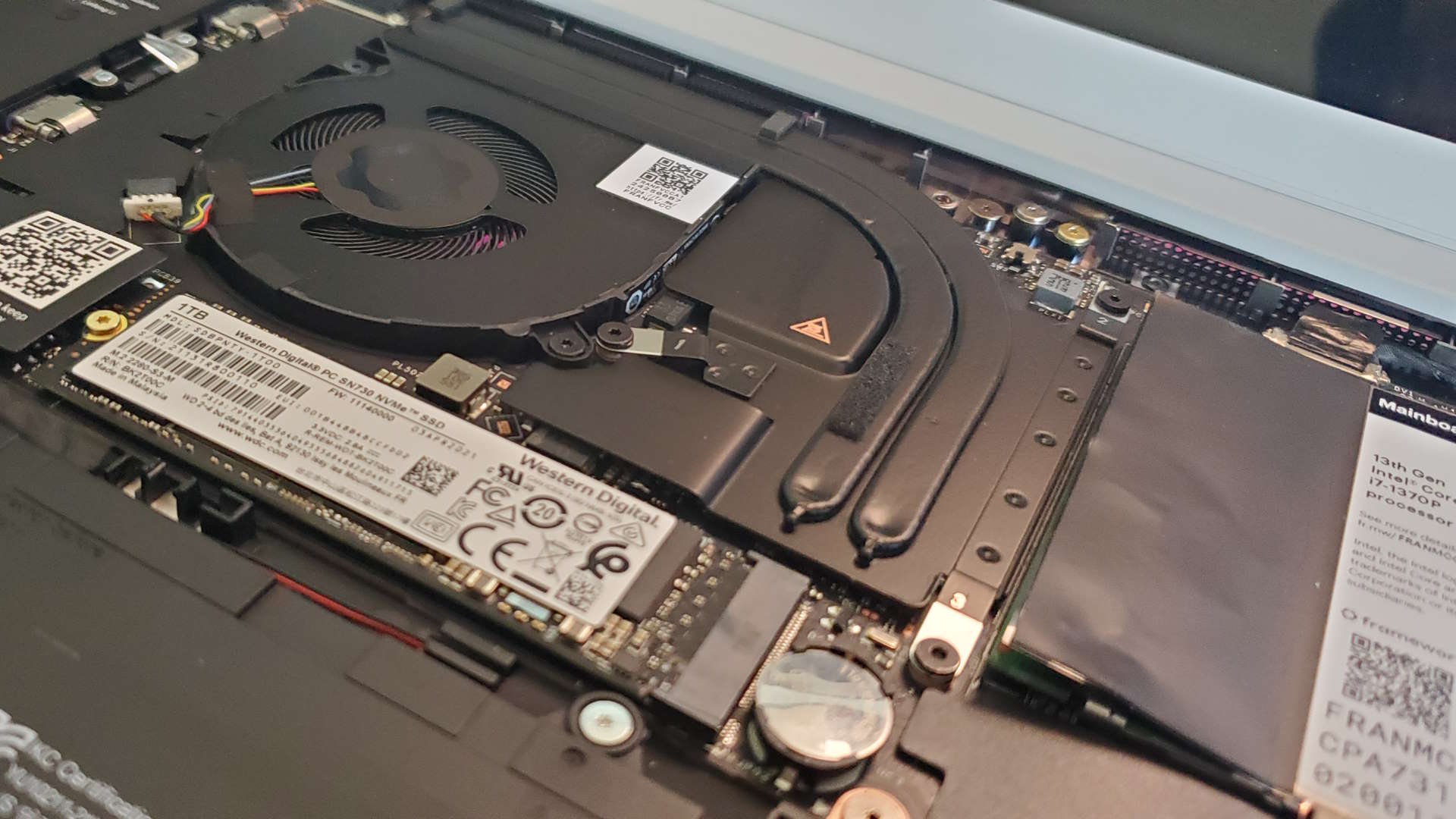
✅ You have an aversion to AMD: The only reason to pick the 13th Gen mainboard over the top-end AMD alternative is because of fruitless tribalism.
❌ You're after more GPU performance: The 13th Gen mainboard still uses the same Intel Xe cores as its forebears, while the Ryzen 7 7840U comes with 12 CUs and genuine 1080p gaming chops.
❌ You want a cheap upgrade: This top board is pricey, especially considering similarly performing 12th Gen mainboards are now being discounted. And that AMD board is cheaper even counting the extra DDR5 RAM you need.
And it would be both more powerful and more efficient than this Intel version. Not to mention cheaper.
Even given the fact you need a new Wi-Fi module and a set of DDR5 memory to pair with it, the Ryzen 7 7840U upgrade kit still comes out cheaper than this Core i7 1370P mainboard on its own.
While that makes this 13th Gen mainboard all but impossible to recommend, it only goes to highlight how powerful a thing the Framework 13 laptop is for the consumer. AMD comes out with a fantastic new mobile chip and I don't suddenly have to completely ditch my laptop if I want to switch. No, I just order a new AMD-based mainboard and I can update my existing machine in a matter of minutes. Then I've got me an ultrabook that will net me genuine 1080p gaming.
This is emblematic of what Framework is trying to achieve, and shows that it's actually delivering generation on generation. This choice is what makes the Framework 13 such a great machine, and what gives me such hope that the Framework 16 will be able to do the same thing for gaming laptops later in the year.
Offering little over the existing, now-discounted 12th Gen mainboards, the Core i7 1370P version is impossible to recommend at this price. But that's also because Framework is broadening its horizons and its first AMD mainboard is such a tantalising prospect.

Dave has been gaming since the days of Zaxxon and Lady Bug on the Colecovision, and code books for the Commodore Vic 20 (Death Race 2000!). He built his first gaming PC at the tender age of 16, and finally finished bug-fixing the Cyrix-based system around a year later. When he dropped it out of the window. He first started writing for Official PlayStation Magazine and Xbox World many decades ago, then moved onto PC Format full-time, then PC Gamer, TechRadar, and T3 among others. Now he's back, writing about the nightmarish graphics card market, CPUs with more cores than sense, gaming laptops hotter than the sun, and SSDs more capacious than a Cybertruck.
